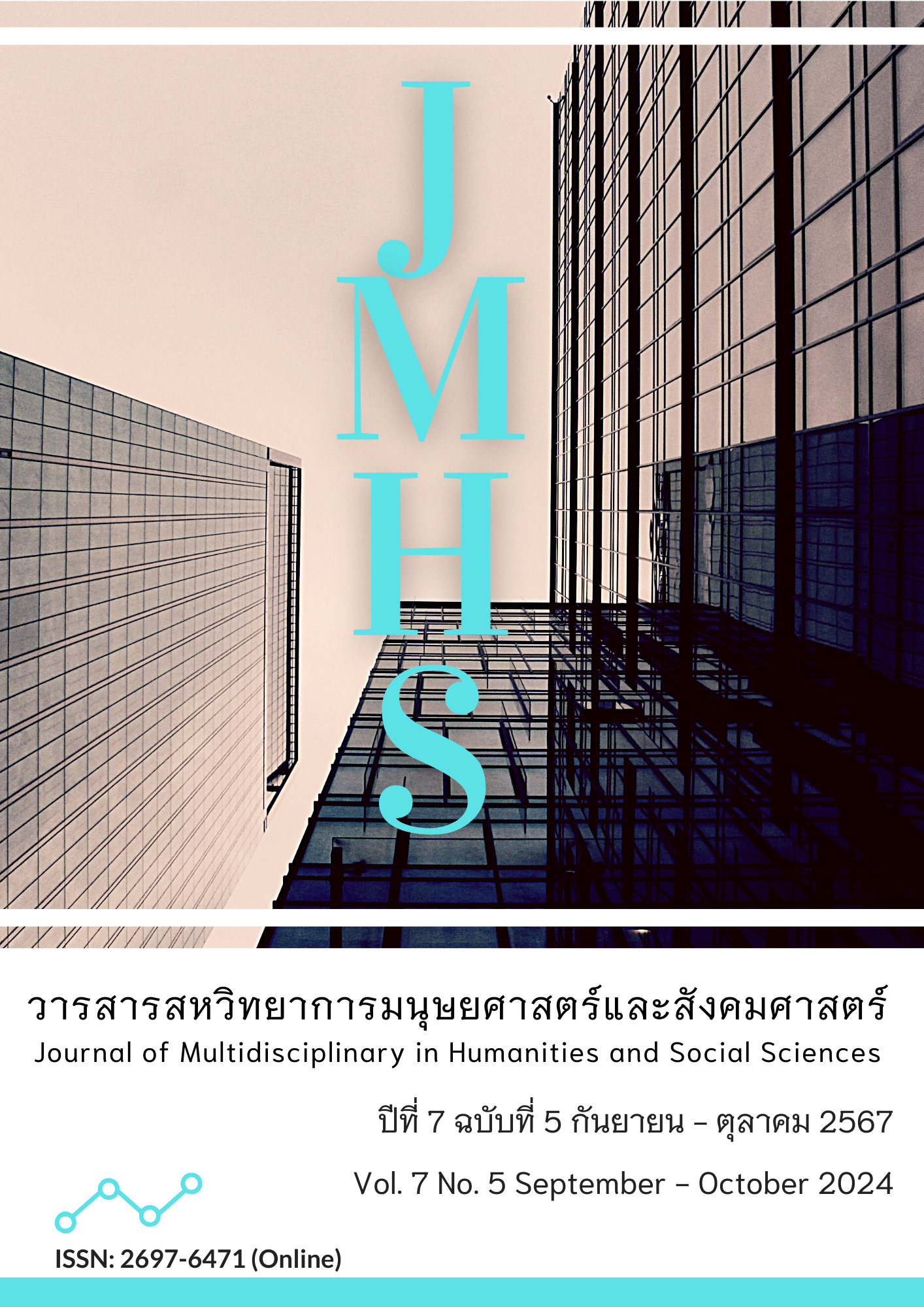พุทธนวัตกรรมการเสริมสร้างและพัฒนาศักยภาพทุนมนุษย์ในองค์กรภาครัฐ
Main Article Content
บทคัดย่อ
การวิจัยครั้งนี้มีวัตถุประสงค์เพื่อ (1) ศึกษาสภาพปัญหา เกี่ยวกับการเสริมสร้างและพัฒนาศักยภาพทุนมนุษย์ในองค์กรภาครัฐ (2) ศึกษาปัจจัยที่ส่งผลต่อการเสริมสร้างและพัฒนาศักยภาพทุนมนุษย์ในองค์กรภาครัฐ และ (3) นำเสนอรูปแบบพุทธนวัตกรรมการเสริมสร้างและพัฒนาศักยภาพทุนมนุษย์ในองค์กรภาครัฐ กลุ่มตัวอย่างที่ใช้ในการวิจัยในครั้งนี้ ได้แก่ อัตรากำลังขององค์การบริหารส่วนจังหวัดขอนแก่น จำนวน 164 คน ผู้ให้ข้อมูลในการสัมภาษณ์แบบมีโครงสร้าง จำนวน 9 คน ผู้ทรงคุณวุฒิในการประเมินรูปแบบพุทธนวัตกรรมการเสริมสร้างและพัฒนาศักยภาพทุนมนุษย์ในองค์กรภาครัฐ จำนวน 9 รูป/คน เครื่องมือที่ใช้ในการวิจัย ได้แก่ แบบสัมภาษณ์แบบมีโครงสร้าง และแบบสอบถาม จำนวน 25 ข้อ มีค่าอำนาจจำแนก (r) ตั้งแต่ ระหว่าง .617-.834 ค่าความเชื่อมั่น โดยใช้สัมประสิทธิ์แอลฟา ได้ค่าความเชื่อมั่นทั้งฉบับเท่ากับ 0.966 สถิติที่ใช้ในการวิเคราะห์ข้อมูล ได้แก่ ความถี่ ค่าร้อยละ ค่าเฉลี่ย,ค่าส่วนเบี่ยงเบนมาตรฐาน,ค่าสัมประสิทธ์สหสัมพันธ์ด้วยวิธีของเพียร์สัน การวิเคราะห์การถดถอยของพหุคูณ และวิเคราะห์เชิงพรรณนา ผลการวิจัยพบว่า
1. สภาพปัญหา และปัจจัยที่ส่งผลต่อการเสริมสร้างและพัฒนาศักยภาพทุนมนุษย์ในองค์กรภาครัฐ โดยภาพรวมอยู่ในระดับมาก และรายด้าน โดยด้านที่มีความคิดเห็นสูงสุด คือ ด้านความต้องการการยกย่อง รองลงมา คือ ด้านความต้องการความผูกพันหรือการยอมรับ ส่วนด้านที่มีความคิดเห็นต่ำสุด คือความต้องการความปลอดภัยและมั่นคง
2. ผลการทดสอบความสัมพันธ์ของระหว่างสภาพปัญหา และปัจจัยที่ส่งผลต่อการเสริมสร้างและพัฒนาศักยภาพทุนมนุษย์ในองค์กรภาครัฐ ที่มีความสัมพันธ์กับความต้องการและความจำเป็นของมนุษย์ทั้ง 5 ด้าน พบว่า มีความสัมพันธ์กันทางบวก อย่างมีนัยสำคัญทางสถิติที่ระดับ .01
3. ผลการศึกษาสภาพปัญหา และปัจจัยที่ส่งผลต่อการเสริมสร้างและพัฒนาศักยภาพทุนมนุษย์ในองค์กรภาครัฐ พบว่า มีตัวแปรความต้องการและความจำเป็นของมนุษย์ ที่ร่วมกันทำนายปัจจัยที่ส่งผลต่อการเสริมสร้างและพัฒนาศักยภาพทุนมนุษย์ในองค์กรภาครัฐ อย่างมีนัยสำคัญทางสถิติ (P-value = .000) ซึ่งตัวแปรทั้ง 3 สามารถอธิบายการผันแปรของปัจจัยที่ส่งผลต่อการเสริมสร้างและพัฒนาศักยภาพทุนมนุษย์ในองค์กรภาครัฐ ได้ร้อยละ 56.0 (R2 = .560) สามารถเขียนสมการพยากรณ์ในรูปคะแนนดิบได้ดังต่อไปนี้ Y = 1.770 + .205X1 + .214X2 + .159X3
4. ผลการประเมินรูปแบบพุทธนวัตกรรมการเสริมสร้างและพัฒนาศักยภาพทุนมนุษย์ในองค์กรภาครัฐ โดยภาพรวมอยู่ในระดับมาก และรายด้าน โดยด้านที่มีความคิดเห็นสูงสุด คือด้านความถูกต้อง รองลงมาคือด้านความเหมาะสม และด้านความเป็นไปได้ ส่วนด้านที่มีความคิดเห็นต่ำสุด คือด้านการนำไปใช้ประโยชน์
Article Details

อนุญาตภายใต้เงื่อนไข Creative Commons Attribution-NonCommercial-NoDerivatives 4.0 International License.
ทัศนะและความคิดเห็นที่ปรากฏในวารสาร ถือเป็นความรับผิดชอบของผู้เขียนบทความนั้น และไม่ถือเป็นทัศนะและความรับผิดชอบของกองบรรณาธิการ
เอกสารอ้างอิง
ดนัย เทียนพุฒ. (2551). บริหารคนในทศวรรษหน้า. (พิมพ์ครั้งที่ 4). กรุงเทพฯ: เอ็กซ์ เปอร์เน็ท.
บุญชม ศรีสะอาด. (2554). หลักการวิจัยเบื้องต้น. (พิมพ์ครั้งที่ 9). กรุงเทพฯ: สุวิริยาสาส์น.
พระครูพิสัย ปริยัติกิจ และ ศราวุธ ปลอดภัย. (2564). การพัฒนาทรัพยากรมนุษย์ในองค์กรตามหลักไตรสิกขา. วารสาร มจร การพัฒนาสังคม, 3(2), 62-75. สืบค้นจาก http://ojs.mcu.ac.th/index.php/socdev/article/view/4292/3032
มหาจุฬาลงกรณราชวิทยาลัย. (2539). พระไตรปิฎกภาษาไทย ฉบับมหาจุฬาลงกรณราชวิทยาลัย. กรุงเทพฯ: มหาจุฬาลงกรณราชวิทยาลัย.
มาลินี สวยค้าข้าว. (2565). หลักการบริหารองค์การโดยใช้หลักธรรมทางพระพุทธศาสนา: ครองตน ครองคน ครองงาน. สืบค้นจาก https://poro.onab.go.th/th/content/category/detail/id/109/iid/21193
โยตะ ชัยวรมันกุล, สุพัฒน์ ชัยวรรณ์, พระมหาวีรธิษณ์ วรินฺโท, ผจญ คำชูสงข์ และ ธวัช หอมทวนลม. (2565). พุทธนวัตกรรมในการพัฒนาการเรียนรู้ของเด็กและเยาวชน. วารสาร มจร พุทธปัญญาปริทรรศน์, 7(2), 91-103. สืบค้นจาก https://so03.tci-thaijo.org/index.php/jmbr/article/view/255993
ลัดดาวัลย์ สุดสวาท. (2559). รูปแบบการพัฒนาทุนมนุษย์ในเขตเศรษฐกิจพิเศษ จังหวัดสระแก้ว(วิทยานิพนธ์หลักสูตรรัฐประศาสนศาสตรดุษฎีบัณฑิต). มหาวิทยาลัยราชภัฏวไลยอลงกรณ์ ในพระบรมราชูปถัมภ์.
สมพร กัสโก. (2561). โปรแกรมเสริมสร้างภาวะผู้นำเชิงพุทธธรรมของบุคลากร โรงเรียนพระปริยัติธรรม แผนกสามัญศึกษา กลุ่ม 10(วิทยานิพนธ์ปริญญาการศึกษามหาบัณฑิต). มหาวิทยาลัยมหาสารคาม.
สำนักงานเลขาธิการสภาการศึกษา. (2549). แผนการศึกษาแห่งชาติ (พ.ศ. 2545-2559): ฉบับปรับปรุง. (พิมพ์ครั้งที่ 9). กรุงเทพฯ: พริกหวานกราฟฟิค.
องค์การบริหารส่วนจังหวัดขอนแก่น. (2560). แผนอัตรากำลัง 3 ปี องค์การบริหารส่วนจังหวัดขอนแก่น ประจำปีงบประมาน 2561-2563. ขอนแก่น: องค์การบริหารส่วนจังหวัดขอนแก่น.
Maslow, A. H. (1943). A theory of human motivation. Psychological Review, 50(4), 370-396. https://doi.org/10.1037/h0054346


